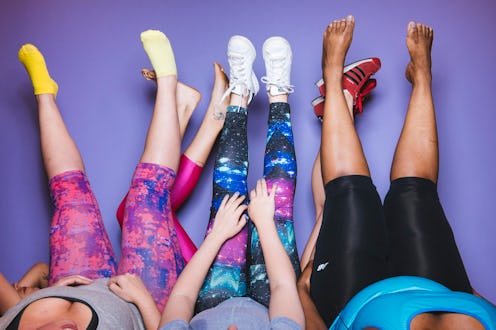Life
This Is The Best Workout To Help You Sleep

Sleep can be a tricky thing. Like, I’ve never been able to figure out how to reconcile my love of staying up late with the fact that I simply cannot function the next day without adequate sleep. So daily obligations being what they are, it’s important to power down in a sleep-optimizing way each night and hightail it to bed to ensure we get adequate shut eye. Luckily, there are lots of things you can do to promote better sleep, and a good workout routine can help. And, per the National Sleep Foundation, there are a few ways to go about finding the best workout to help you fall asleep — but it isn't going to be the same for everyone. That means, however, that you have options.
If you’ve ever struggled to fall asleep at night, despite your absolute best efforts to set up a good bedtime routine and maximize your quality zzz’s, you’re definitely not alone. According to the American Sleep Association, a whopping 50 to 70 million Americans have some form of sleep disorder, while about 30 percent report insomnia proper, so it's pretty common to struggle with sleep at some point. And while getting regular exercise offers a ton of overall health benefits, it can also really help when we’re struggling to improve our sleeping patterns. The National Sleep Foundation recommends yoga, strength training, and cardiovascular exercise as your best options for better sleep — but know that you may need to play around with various workouts to figure out what works best for you.
The reasons that this super-sleep trifecta works are pretty clear: yoga is especially good for stress-related sleep problems since the focus on breathing and relaxation helps calm the nervous system down. And you’re still getting a great workout with yoga, so the body gets fatigued in a way that can help when your sleep needs improvement. According to Psychology Today, research shows that low impact and stress-busting yoga is a great antidote to insomnia — regardless of the root cause.
The National Sleep Foundation further recommends cardiovascular workouts like running, spin class, or Zumba for better sleep. Even brief, 10 ten minute cardio workouts can help, but the recommendation is to try and hit a goal of 150 minutes of moderate intensity exercise per week. This will, quite literally, tire you out and make it easier to sleep — but avoid doing cardio later in the day or closer to sleeping, as having your heart rate elevated can make it more difficult to drift off.
Strength training, too, is another great option for further promoting nightly sleepiness. Studies have suggested for a while now that strength and resistance training have a positive impact on sleep. The National Sleep Foundation reports that building muscle helps relieve insomnia, and body weight exercises, like push-ups, pull-ups, squats, and crunches can all help you fall asleep faster and sleep better with time.
Furthermore, if you're trying to keep it low-key, daily stretching is a key component of a healthy fitness routine, as you definitely want to protect those muscles from injury pre and post-workout. And Fitness also reports that a stretching routine before bed can help you fall asleep in no time. Try bending and touching your toes, or gently bending your arms — doing this as part of a nightly routine will help you feel more relaxed and get you into a sleepy mood.
So go play around with different routines — you’ve got choices. And with a little experimentation, discipline, and time, you’ll be sleeping better before you know it.